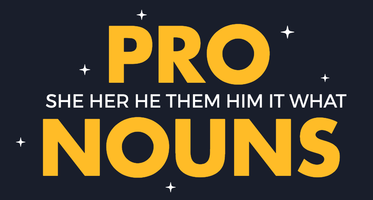 It was bound to happen sometime. I was out with a friend-acquaintance-colleague I hadn't seen in a few years. She was ordering for both of us and--gesturing to me--told the server, "They'd like a cup of coffee." [Record player screeches to a halt.] I have always used "she," so it was weird to me that this friend would assume that I had switched to "they." It's not as if I look more masculine than I did a few years ago. I can only assume that for her, the context has changed--people who look like me (butch women) are now, at least as a default, "they." I corrected my friend, saying, "She, please," (after the server left), and my friend replied, "Oh, I just wanted to be safe." Safe? Wouldn't "safe" be assuming that I still use the pronouns I have always used, unless I tell her otherwise? My friend replied that most people who look like me use "they." I continued to boil quietly about this. Afterward, I kept wondering why it bothered me so much. I don't get angry when people accidentally call me "he"--in fact, I go out of my way to tell them not to worry about it. Gender mistakes happen. Who cares? Although, if someone who knew me suddenly started referring to me as "he," I would be surprised and possibly annoyed. But I still think "they" bothered me more than "he" would have. And it's not as if I'm the pronoun police. When I'm in a group and we have to go around and give our preferred pronouns, I now tell people that I don't care about pronouns. They always use "she," because (1) my name strongly signals "femaleness" and (2) I think(!?) I "look like a woman"--or rather, I look like some instantiation of woman with which they are somewhat familiar (the outside layer of a Rachel Maddow babushka doll). But I guess I do care about pronouns--at least a little. I didn't like my friend assuming that a gender nonconforming look is de facto incompatible with being a woman. I felt like I was being gender policed--as if she was telling me, "You're not doing 'woman' correctly anymore--people like you are a 'they.'" This chafes me. A "she" can look any way at all. And part of my stubborn refusal to use anything but she, despite my annoyance at the very existence of gendered pronouns, is an assertion that this is what a woman looks like. Grr. I don't know. It's weird. If I hate gendered pronouns, why don't I like "they?" I'm still wrapping my head around why I cared so much. It's at least partly because I don't love "they" as a singular pronoun. Maybe I should just adopt a random word or phrase, like "puppy" or "the silver robot" or "sulky capybara" as my pronoun. Then she would have had to say, "The silver robot would like a cup of coffee," so I'd at least get a chuckle out of it.
18 Comments
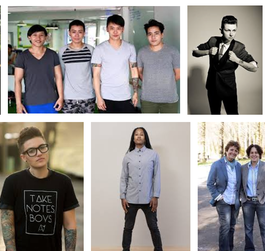 Some results of a Google image search of the words "butch" and "trans" Some results of a Google image search of the words "butch" and "trans" I was having drinks with a friend the other night, and as often seems to be the case with lesbians these days, we fell into a discussion about the relative prevalence of trans men now as compared to, say, 10 or 15 years ago. My friend’s question was: why now? Why are there so many trans men, particularly young ones, at this moment in time? My first response was a version of the “backlog” argument I made a few years ago on this blog: trans men have always been around; it’s just that a more extensive physical transition was less available until recently, so many of them chose to live as butch lesbians. My friend didn’t buy it. Her arguments were: (1) It’s still expensive to transition, so it’s not like it’s that “available” now compared to 10 years ago, and (2) There have always been people born as women who identified as men and lived as men. She’s right about both, I suppose--although I'm certain that hormones, trans-positive therapists, etc., are a lot more prevalent than they used to be. (Maybe are we wrong and there aren't more trans men, just more trans visibility? But I don't think we're wrong.) Or, perhaps it is not about scientific or hormonal or surgical availability; perhaps it is about cultural availability. Perhaps it used to be the case that someone born a woman who identified as masculine didn’t used to have models for what a transition was like, or a community that would be accepting, or—and this is crucial—the internet as a trove of resources and potential connections. Perhaps this lack of “cultural availability” made it more difficult, because even though transitioning is hard now, maybe it was a lot more isolating back then. I feel like it had to have been. So I guess that's still a "backlog" argument, but a different kind of backlog argument. Another possible explanation is that there has been a resurgence of gender essentialism—maybe it just seems way more comfortable and plausible to live as a gender-conforming man than as a gender nonconforming woman. As my friend told me, “Lesbians have never been in fashion.” True enough (although we have our flashes of hip visibility every now and again—see, e.g., Rachel Maddow on the cover of Rolling Stone). But it’s not like trans men are “in fashion” in a mainstream sense either—I’m hard-pressed to think of trans men with Maddow-level visibility. Then again, trans men are men, and often pass as cis men to everyone around them—and men have always been in fashion. So maybe if you don’t have a strong sense that you were born in the wrong body (I know that many people do—I’m talking about those who don’t), but you know you’re masculine, it’s psychologically more comfortable to be a guy. I don’t know. I don’t have a good answer to my friend’s question, and I thought it was kind of an uninteresting question in the moment (duh—the backlog thing + scientific advances). But the more I think about it, the more I think it’s a good question. Why now? Happy Butch Wednesday! A few days ago, I received this email from a reader, and decided to share my answer on the blog. Here's the email (edited for length):
I came across your blog last night when I googled "can I be a transgender women and butch." I'm a transgender woman at the beginning of my transition to be true to myself. I started HRT a month ago during Pride. I smile when I say that because I am proud. I've spent the last several years trying to learn who I really am and where I want to go. I have some of the dysphoria most trans people talk about but sometimes I wonder why I'm not more bothered by it. I know that may sound crazy but what bothers me more is trying to understand why I feel like a woman but want to retain some form of masculinity. I prefer to wear the women's version of a masculine look. I'm athletic and a tomboy. My sexual preference is women. Can I actually be a butch lesbian and transgender? Is what I feel and the way I want to present myself accepted in the butch community? I feel like people will ask why I'm transitioning if I want to be masculine. I honestly feel like a woman. I'm no expert on transgender identity, and I hope some of my trans readers will weigh in and share their thoughts in the comments. But personally, I think the answer is an emphatic yes. Of course you can be a MTF butch, because trans women are women, and there are all kinds of women, and butch is one of these kinds. It makes perfect sense to me! You bring up some really good points, and I'll respond to as many as I can. The stickiest question, perhaps, is whether you will be "accepted" within the butch community. My responses are threefold:
The boundaries of the butch community, such as it is, seem more porous than ever. I've even gotten angry emails from people when I've defined butches as masculine women. These readers pointed out that I was excluding trans men, who might still identify as butches, just not as butch women. And, of course, there are plenty of nonbinary people who identify as butch, women who identify as genderqueer and not butch, genderqueer people who identify as butch but not as women--the list goes on. One result of this increasing porousness is that it can feel confusing and/or threatening to people w hoID as butch women. After all, a hallmark of butch womanness is masculinity. What does it mean if another woman starts taking testosterone, stops identifying as female, gains muscle mass and a square jaw, and still identifies as butch? A woman who also identifies as butch may then feel less masculine in comparison. In effect, she feels she has been "feminized" in comparison to her butch counterparts. And many butches do not like to feel feminized, so it creates all this policing--e.g., "Well, that person who takes T isn't really butch--they're in a different category now." I understand this policing, and I understand the person who doesn't want to abandon their butch identity simply because they're on testosterone or no longer use female pronouns. This is part of the reason there's sometimes tension between trans men and butch women . So this all means you're stepping into a bit of a quagmire. On the whole, I suspect that if they're concerned about trans people identifying as butches, most butch women are thinking about the FTM phenomenon, not the MTF phenomenon. There's this idea that butch women are disappearing. (Personally, I love the idea that even if we are "losing" butch women, we are also gaining them!) If you do meet resistance from butches, I suspect that it will have to do with some of your biologically "masculine" traits. Statistically speaking, you are likely to be taller, deeper-voiced, slimmer-hipped, etc., than most cis women. Butches might be jealous. Or they might read you as a cis man, even accidentally. Even though you're a masculine woman, you might have to find ways to accentuate your femininity to be read in the way you prefer. I don't mean that you need to wear a skirt or do something else dysphoria-inducing--certainly not! I just mean that until they see the strap of your sportsbra outlined beneath your T-shirt, other butches might not know how to read you. Dating may (or may not) be a little challenging. I don't know what your plans are for bottom surgery--you need to do what's right for you. I'm going to assume that at this point, you have the genitals you did at birth: presumably, a penis. When it comes to dating, Surprise Penis is not the best kind of penis. The decision about how and when to out yourself as trans to anyone you're naked with is personal (I'm trying to get a trans woman friend of mine to guest post about exactly this). But I will say that suddenly encountering a penis where one does not expect to encounter a penis has the potential to be threatening or traumatizing to the person you're with. Disclosing your trans status can be a burden, but whether it's fair or not, people who see you as a cis woman, and with whom you're intimate, will expect you to do it well before naked time. More on that in a future post. You also mentioned that people might wonder why you're transitioning at all if you want to be masculine. You're right--they might! But you answered this yourself: "I honestly feel like a woman." It's kind of similar, actually, to when people ask people who date butches, "Why don't you just date a man?" The answer, in short, is that female masculinity and male masculinity are different--which seems to be something you feel, too, having experienced both first-hand. Female masculinity seems to feel really comfortable to you, and it's really great that you've figured that out. I'm sure it wasn't easy. In sum, you sound awesome and interesting and like you're well on your way. I'm excited for you and wish I could give you a hug and a fist bump. You're in for a wild ride--stay true to yourself, and try to ignore people who don't understand you or tell you that you "can't" be a certain way. Welcome to the butch community! Happy Butch Wednesday, dear readers! I have a confession: I'm a podcast addict. I know this may sound faux-cerebral in a self-deprecating way, like saying, "I'm addicted to foreign film critiques," or, "I just can't get enough Dostoyevsky." But don't be fooled--it's not NPR I'm pounding. I am a serialized fiction podcast addict. There's something epic and wonderful about listening to stories in installments, and I particularly enjoy the ones that can convincingly mimic an "in-depth reporting" format. I'm not into stories that involve zombies or get too hard core sci fi or too horrifying with the horror. For the record, I have found the following brilliant:
My deep dive into all things podcasty has made me aware that this relatively new genre (or we might say "revitalized genre," given radio's history of serialized stories) is much more diverse in its representation of sexual orientation and gender identity (and in some cases, race and disability) than other forms of media. The cool thing is that the LGBTQ characters don't usually feel like tokens, nor is their queerness the focus of the story. It's just part of who they are. You know, like how we live our lives. 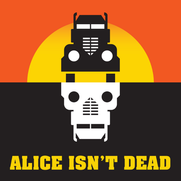 For example, Keisha, the protagonist of "Alice Isn't Dead" is a truck driver who is searching for her wife, who supposedly is dead, but whom Keisha doesn't believe she is dead. (Oh shoot--I just realized there are, in, fact, zombies in this one, so I guess I was wrong about the zombie prohibition above. Alice isn't a zombie, though--the Thistle Men are the zombies. Um, who are the Thistle Men? It's a long story--listen for yourself.) My point is: Keisha isn't a Lesbian Truck Driver, she is a truck driver looking for her spouse. Her sexuality is not The Thing. It's just who she is. The story could have been about a wife looking for her husband, or vice versa. But it's not. See what I mean? 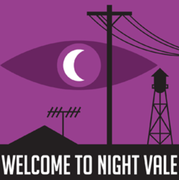 Another example is Welcome to Night Vale, which took a long time to grow on me. It's a "community radio show" about a desert town where the paranormal is normal, where a literal five-headed dragon named Hiram McDaniels runs for mayor, and where no dogs or people are allowed in the Dog Park due to the presence of mysterious hooded figures. This is all wacky and awesome, and it's made even more awesome by the fact that the least wacky part of the plot is that several of the characters are queer. This includes the protagonist, Cecil (the show's host), Carlos the Scientist, and Sheriff Sam (who is maybe the only nonbinary character I've seen represented in non-queer-focused media except for Asia Kate Dillon's portrayal of the captivating Taylor Mason on this year's season of "Billions"). 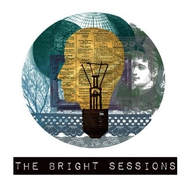 The Bright Sessions, which is the "recording" of psychotherapy sessions with paranormally interesting patients, includes a great portrayal of a high school football player named Caleb, who in addition to struggling with his involuntary ability to experience other people's emotions, is also falling in love with a boy in his class, even though he's never thought about himself as gay. The gay thing is a surprise to him, but it wreaks way less havoc on his life than his special abilities do. And in fact, since a number of the characters struggle with whether to "come out" to people in their lives about their special abilities, we might draw a lot of other parallels as well. You get the idea. I can't be the only podcast addict, am I? Please tell me I'm not. If you aren't listening to podcasts yet, give some a shot. (If you want a personalized recommendation, send me an email and tell me what you usually read and I'll send you my thoughts.) And if you are a podcast dork like yours truly, do you (1) agree with me about the queerness and/or (2) have any recommendations for me?
I didn't expect to be writing another post so soon, but just 20 minutes after I posted the last one, President Trump tweeted the following: This is jaw-dropping, insulting, and unbelievable. The money argument is a joke. If this was about money, why don't we ban cis people with hormonal deficiencies, or who require medication or surgery? For that matter, why don't we ban people with kids from serving in the military? After all, why should we have to pay insurance costs just because they chose to reproduce? Oh--what's that, you say? We care about people's health? About treating people as people and allowing them to grow into their fullest, healthiest selves? But... not if they're trans. Nah, those people are somehow different. FWIW, I responded: This is not about money. This is not about "disrupting" military service--if it was, the policy would be tailored much better (e.g., yeah, I get it that if someone is having surgery that month, they should probably not be in Afghanistan... but that would be true for any surgery, wouldn't it?). This is about discrimination, pure and simple. I hope all the Trump voters who insisted that Trump would be fiiiine about LGBTQ rights, and that he was just "posturing" feel horrible now. Who cares what his personal position is? His political position is going to destroy lives.
As Cameron Esposito and others have since pointed out, Trump's tweets also seem contradictory. "Would" entail? Would? As if this is hypothetical? Currently, thousands of trans people serve in the military, which Trump doesn't acknowledge. Are they going to be kicked out? Presumably so. Why isn't be acknowledging that transgender people are serving already? Why isn't he offering any data to support the most backward policy since DADT? Please talk to people about this. Get involved, even if you're not trans--heck, especially if you're not trans. This is time to show the world that the whole queer community stands up for the T part of LGBTQ. Post on Facebook. Write to your senator. Yell in the street. Do not be silent. This is way too big and important. Please post your thoughts below, and I I'll be talking about this more as the situation unfolds. P.S. If you are a trans person who serves in the military and are reading this, please email me. I would really like to talk to you about how this will affect your life, and I would very much like to share your story with BW readers. |
|
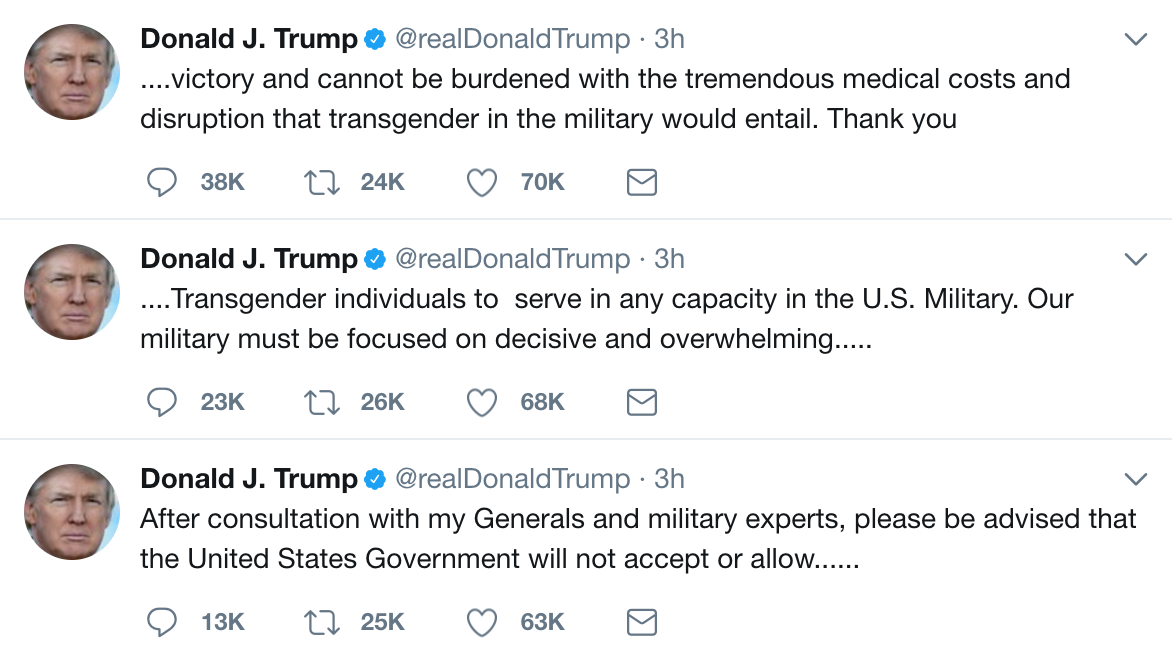


 RSS Feed
RSS Feed